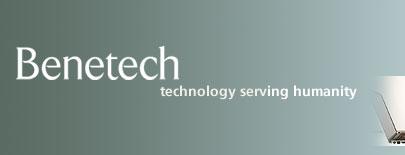
Jim Fruchterman |
September 2007
As always, I’m happy to share the latest news from Benetech. We’ve strengthened our team, and we’re digging into our first long-term strategic planning cycle in five years. We continue to get great press coverage for our work. I’m spending more time thinking, writing and getting revved up. There are so many great ideas percolating inside and outside of Benetech – we need to make sure more of them happen!
Here’s the cool stuff I’m covering in this letter:
- Bookshare.org is going global and received great coverage from CBS News
- New senior team members, Lisa Friendly and John Crossman, plus recruiting a Director of Marketing
- Human rights updates from the field, including Patrick Ball in The Hague and more progress in Guatemala
- Thought pieces: Nothing Ventured, Nothing Gained and Raising the Floor
- New Papilia system for stakeholders
Bookshare.org Globalization and CBS News Coverage
You may remember that at the 2006 Clinton Global Initiative we committed to take Bookshare.org beyond the United States. We’ve made terrific progress, starting with a $250,000 grant from the Bernard A. Newcomb Foundation at the Peninsula Community Foundation and $25,000 from Microsoft. Bernie was a cofounder of eTrade, which was founded in our exact building and occupied our offices. One of the great coincidences that happen in Silicon Valley!
Other key actions towards global outreach include soliciting worldwide permissions from publishers and authors, and we’re now up to a critical mass. Converting books from publisher-specific formats into accessible formats has been a huge challenge, but we’ve been working steadily on this problem with vendors like Adobe and are now making real progress. We also had to make significant changes to the Bookshare.org website to accommodate international users, and these changes have just been rolled out. Thanks to funding from the Community Technology Foundation of California and our partnership with Tiflolibros of Argentina, a group very much like Bookshare.org, we now have over 1000 books in Spanish available to our users worldwide.
As one of the first actions with my MacArthur fellowship in December, I traveled to India and Bangladesh and had the chance to talk to NGOs (international name for nonprofits) and blind people. We see tremendous opportunities for partnering in India to both serve more people with print disabilities and to increase the numbers of books in our Bookshare.org library.
We were also fortunate to have great coverage of Bookshare.org in the CBS Evening News. This brought welcome attention to our users and volunteers and the donors who support what we are doing. The three minute piece, which you can play directly from our Bookshare.org front page was a compelling, beautifully executed look at how we serve our members as they go about their daily lives.
New Senior Team Members
Benetech succeeds based on our team, and we’ve been able to strengthen our team with two key people in engineering and literacy. Lisa Friendly is our new Senior Product Manager for Literacy and comes to us from a distinguished career at Adobe/Macromedia and Sun Microsystems. Lisa was director of software documentation at Sun and responsible for the Java Series. John Crossman is our new Engineering Manager and comes from senior positions at CNET and other leading firms. He has experience building websites and managing engineering teams. Their full bios are on our website.
Both Lisa and John are examples of what makes Benetech great. We run on a relative shoestring, and yet senior people from the Valley like Lisa and John are eager to join us because we offer them a chance to use their considerable talents to solve social problems. Other sources of extraordinary talent are the wonderful fellows and interns who come to Benetech to learn about social entrepreneurship and contribute their specialized expertise to our mission. I’m searching right now for a Director of Marketing, so be sure to send great people my way!
Human Rights Update
We’re incredibly busy all over the world right now, working on projects we can tell you about and on projects that we can’t (at least, not yet). Patrick Ball went to The Hague to reprise his famous testimony as the lead-off expert witness against Slobodan Miloševic. Since Miloševic died before his trial concluded, none of the testimony from that trial can be used. Much of the data presented in the Miloševic case must now be presented again in the ongoing trials of the top Serbian generals who were responsible for what happened in Kosovo.
Our work supporting the Guatemala National Police Archive is making great progress and getting great attention. The archive project there is the largest Martus user (our free and open source human rights reporting and database software), with over 30,000 bulletins based on the archive. Ann Harrison, our Communications Director, just completed a photo-essay that tells the story of our work there. Martus use is up over 400 percent from last year in terms of bulletins on Martus servers we know about. The server software is also open source and is being used elsewhere on servers where we have no access to usage data.
We are hopeful about expanding our work with the Truth and Reconciliation Commission (TRC) of Liberia in the next couple of months. The TRC's mission provides a unique opportunity to clarify Liberia's history relating to the violence of the recent civil war, which ended in 2003, and provide accountability for human rights violations. The TRC forms an integral part of Liberia's efforts to recover from the war and enjoys the support of Liberia's current president, Ellen Johnson-Sirleaf, the first elected African female head of state.
Since the TRC's inauguration in June 2006, our Human Rights Program has advised the TRC on methods for large-scale data collection and the use of quantitative analysis to address key questions about the nature of the conflict and human rights violations. Outreach Coordinator, Kristen Cibelli, recently spent a month in Liberia working with TRC staff to design and implement a process to convert the qualitative information collected in thousands of victim and witness testimonies into data that can be used for analysis. This process is called "coding" and involves classifying the narrative information about victims and violations using consistent, repeatable definitions.
Thinking about the Field
Now that I’ve been doing this for over 18 years, I increasingly feel the need to do more than concentrate solely on Benetech work. I want to help others get into to the field of social action and want to make it more likely that they succeed. I’ve greatly benefited from the support and ideas of others, and want to be sure to do my part. Having received a MacArthur Fellowship I feel a great responsibility to encourage other social entrepreneurs, as well as greater involvement by the tech business community in helping global society. We need to raise awareness of the impact and the leverage realized by those visionary donors who are investing in social entrepreneurs. One example is that the main newspaper of Silicon Valley, the San Jose Mercury News, carried an op-ed I wrote entitled “Build Great Companies, Then Help Build a Great World.”
I’m excited about a new paper just published, that I co-authored with Jed Emerson and Tim Freundlich, called Nothing Ventured, Nothing Gained, Assessing the Critical Gaps in Risk-Taking Capital for Social Enterprise. Coming from Silicon Valley as an entrepreneur, I know what a great financing system exists here to bring companies along the track from an idea to startup to expansion to a public offering and beyond. Nothing Ventured, Nothing Gained talks about the need to have the same kind of system in place for social ventures. As philanthropists and foundations tackle increasingly complex and global problems, we will need a system that encourages high performance and measurable impact.
Raising the Floor is a new theme I’ll be sounding in essays and new op-eds. The concept is that everybody deserves basic access to technology and information. My first op ed on this topic was invited by and just published by the Sacramento Bee with the title “Everyone Deserves Access to Technology.” I strongly believe that it is within our capability as a global society to ensure that each person has access to a device (e.g. a cheap cell phone) that can communicate with other people and provide access to key health, education, news and government information. I’ve borrowed the term (with permission) from my close associate, Prof. Gregg Vanderheiden of the University of Wisconsin’s TRACE R&D Center. I hope to follow up with numerous additional essays laying out what we could be doing as a society, and get more people behind this initiative.
New Papilia Stakeholder Communication System
Benetech has so many fast moving projects, we need to make it easier for stakeholders to control what information they get from us. Also, you might have noticed that it has been over six months since my last (quarterly!) president’s update. So, we’re implementing Papilia, a new communications system to give our funders, users, partners, volunteers, advisors and general Benetech fans the ability to choose areas of interest and flow of information according to personal preferences. We’re dedicated to user control over technology, so we doubt it will be a surprise to see us implement user control through opting-in mechanisms.
You will soon receive a message from us about this new system that will provide you an opportunity to opt-in in order to receive material in the way you prefer and on the topics that capture your interest. I encourage you to respond to the email and exercise your options to shape our communications with you. If you have questions, feel free to contact me at [email protected] or Peggy Gibbs at [email protected].
Conclusion
The technology business community is increasingly aware of the incredible power we have to improve global society. We strongly support that trend, and we encourage our peers to engage in social action both inside and outside business. The barriers to participation keep getting lower and we see the positive impact that technology can make in people's lives. Together we can raise the technology floor for everyone on the planet. I hope you continue to join us in supporting this change, which is crucial for our globe’s future!
Jim Fruchterman
President and CEO, The Benetech Initiative
Email: [email protected]![]()

